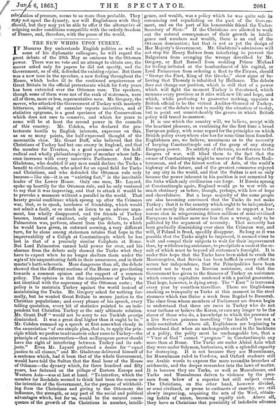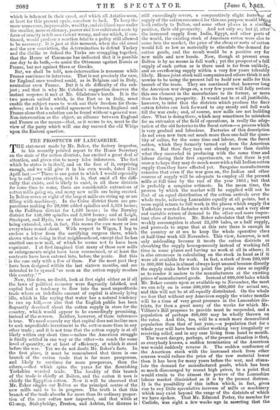THE NEW WHIGS UPON TURKEY.
IF Musurus Bey understands English politics as well as some of his diplomatic colleague., he will regard the great debate of the 29th May as ominous to the Ottoman power. There was no vote and no attempt to obtain one, the mover asked only for papers he did not specify, and the Government, as of old, defended the existing regime. But there 'was a new tone in the speeches, a new feeling throughout the House, which bodes ill to the continued acquiescence of Great Britain in the official protectorate which for forty years has been extended over the Ottoman race. The speakers, though some of them were not of the rank of statesmen, were all of them, more or less, representative men. Mr. Gregory, the mover, who attacked the Government of Turkey with masterly bitterness, making of consular reports invectives, and of statistics epigrams, is a good specimen of the Conservatism which does not care to conserve, and which for years to come will be at least the second power in the councils of this country. Mr. Cobden, who declared the pro- tectorate hostile to English interests, expresses on this, as on so many points, the half-expressed thought of the mercantile class. Mr. Grant Duff, who believed that the Christians of Turkey had but one enemy in England, and that the member for Tiverton, is a good specimen of the half- radical and wholly philanthropic type of member whose influ- ence increases with every successive Parliament. And Mr. Gladstone, who doubted if any man could declare the Turks a benefit to civilization, who asked for an equal field for Turks and Christians, and who defended the Ottoman rule only because—like sin—it is an "existing fact," is the inevitable leader of the Lower House. Only one man, Mr. Layard, spoke up heartily for the Ottoman rule, and he only ventured to say that it was improving, and that to attack it would be to provoke a massacre without a parallel in the 'world. That hearty genial confidence which sprang up after the Crimean war, that, so to speak, insolence of friendship, which would not admit a fault, or so much as listen to an adverse argu- ment, has wholly disappeared, and the friends of Turkey become, instead of exultant, only apologetic. True, Lord Palmerston was, perforce, absent from the debate, to which he would have given, in outward seeming, a very different turn, for he alone among statesmen retains that hope in the improveability of a Caliph at Constantinople which he has lost in that of a precisely similar Caliphate at Rome. But Lord Palmerston cannot hold power for ever, and his absence from the debate only showed the Turks what they have to expect when he no longer shelters them under the regis of his unquestioning faith in their assurances, and in their master's hatti-schereefs. More dangerous than all, the debate showed that the different sections of the House are gravitating towards a common opinion and the support of a common policy. The opinion is that the independence of Turkey is not identical with the supremacy of the Ottoman caste ; the policy is to maintain Turkey against the world instead of maintaining the Turks. Mr. Gregory asked for nothing for- mally, but he wanted Great Britain to secure justice to the Christian populations; and every phrase of his speech, every telling quotation, every bit of statistics pointed to an inde- pendent but Christian Turkey as the only ultimate solution. Mr. Grant Duff "would not be sorry to see Turkish prestige diminished. It was a great deal higher than it ought to be." Mr. Cobden summed up a speech at first somewhat cloudy in the enunciation "of one simple plan, that is, to apply the prin- ciple which we profess to advocate in other cases to Turkey—the principle of non-intervention—that noEuropean power should have the right of interfering between Turkey and its sub- jects." Even Mr. Layard professed a desire for "equal justice to all classes," and Mr. Gladstone delivered himself of a sentence which, had it been that of the whole Government, would have told the Sultan that the final hour of the House of Othman—the dynasty which, for three hundred and fifty years, has fattened on the pillage of Eastern Europe and Western Asia—was at last at hand. "To interfere, which the member for Rochdale seemed to think had been the course or the intention of the Government, for the purpose of withhold- ing from the Christians and giving to the Ottomans the influence, the strength, or any part of the social and political advantages which, but for us, would be the natural conse- quence of the growth of the Christians in number, intelli-
gence, and wealth, was a policy which he was quite safe in renouncing and repudiating on the part of the Govern-
ment, and on the part of his honourable friend the Under- Secretary of State." If the Christians are allowed to work out the natural consequences of their growth in intelli- gence and numbers and wealth, there is an end of the Ottoman domination ; but that is not as yet the design of Her Majesty's Government. Mr. Gladstone's admissions will not stop Sir Henry Bulwer from interfering to prevent the Bulgarians from avenging the wrongs described by Mr. Gregory, or Earl Russell from scolding Prince Michael for feeling irritated at the bombardment of his capital, or Lord Palmerston from ordering a fleet to the Pirmus, should "George the First, King of the Greeks," show signs of be- lieving that Thessaly is inhabited by Hellencs. The debate does not change our position, which is still that of a power which will fight the moment Turkey is threatened, which menaces every province as it stirs with new life and hope, and which, while professing to guarantee nothing, appoints a British official to be the virtual Auditor-General of Turkey. The use of the debate is not to modify the situation of to-day, but to point out unmistakeably the groove in which British policy will travel to-morrow.
It is one which the country will, we believe, accept with the heartiest pleasure, as combining for the first time a broad European policy, with some regard for the principles on which British policy everywhere else has for some time been founded. Englishmen are, we believe, unanimous as to the necessity of keeping Constantinople out of the grasp of any strong European power. No subtlety of rhetoric, no reference to the dangers of war, will blind them to the fact that the owner of Constantinople might be master of the Eastern Medi- terranean, and of the fairest section of Asia, of the world's highway of the future, and of the greatest commerce enjoyed by any city in the world, and that the Sultan is not so only because the power inherent in his position is not cemented by the links which only civilization can forge. if Russia sprang at Constantinople again, England would go to war with as much obstinacy as before, though, perhaps, with less of hope and cheerfulness. But a large majority of the same people are also becoming convinced that the Turks do not make Turkey ; that it is the country which ought to be independent, and not merely its aristocratic caste; that to support a bar- barous clan in misgoverning fifteen millions of semi-civilized Europeans is neither more nor less than a wrong, only to be palliated by the argument of necessity. That necessity has been gradually diminishing ever since the Crimean war, and will, if Poland is freed, speedily disappear. So long as it was possible that the Turks might be improved, it seemed wiser to wait and compel their subjects to wait for their :mprovement than, by withdrawing assistance, to precipitate a contest the re- sult of which must be beyond all statesmen's foresight. It is under this hope that the Turks have been aided to crush the Montenegrins, that Servia has been baffled in every effort to secure her independence, that the Principalities have been warned not to trust to Russian assistance, and that the Government has given to the finances of Turkey an assistance which country capitalists confound with a partial guarantee. That hope, however, is dying away. The " East" is traversed every year by countless travellers. There are Englishmen smoking as tranqually as Turks at this moment in the steel steamers which run thrice a week from Bagdad to Bussorah. The class from whom members of Parliament are drawn begin to understand that there are races in Turkey who do not wear turbans or believe the Koran, or care any longer to be the slaves of those who do, a knowledge to which the presence of a live Servian princess travelling "for health" has not a little contributed. Above all, Englishmen are beginning to understand that when an unchangeable creed is the backbone of a polity, the polity must be unchangeable too, that a "Vicar of God" cannot " progress " in Constantinople any more than at Rome. The Turks are under Abdul Aziz what they were under Solyman, barbarians, with a splendid capacity for destroying. It is not because they are Mussulmans,
for Mussulmans ruled in Cordova, and Oxford students still use Arabic words to express the more recondite branches of
arithmetic, and the deeper researches into the laws of mutter. It is because they are Turks, as well as Mussulmans, and Turks and Mussulmans driven to violence by the pres- sure from below of a superior but still subject . creed. The Christians, on the other hand, however divided, or semi civilized, or prone to outbursts of anarchy, are still slowly improving, acquiring the arts of the West, obtain- ing habits of union, becoming rapidly rich. Above all, they have as Christians that possibility of indefinite advance -which is inherent in their creed, and which all Asiatics seem, at least for this present cycle, somehow to lack. To keep the more numerous, improveable, wealthy, and civilized race under the smaller, more stationary, poorer and less cultivated caste by • force of cruelty is felt as a violent wrong, and one which, if con- tinued, would produce a reaction fatal to a policy still allowed to be necessary. It is just at this moment, when the old creed and the new conviction, the determination to defend Turkey and the dislike to defend the Turks are struggling together, that the House of Commons has indicated that it is possible one day to do both,—to assist the Ottomans against Russia or France, but not against Slays or Greeks.
But, we shall be told, non-intervention is nonsense while France continues to intervene. That is not precisely the case, for England once resolved could, as in Belgium and in Italy, neutralize even France. But it is the difficulty of the sub- ject ; and that is why Mr. Cobden's suggestion deserves the instant response it met at Mr. Gladstone's bands. It is the • two powers united which, in the East as in Italy, must enable the subject races to work out their freedom for them- selves; and it is in a cordial agreement between England and France alone that a solution can be found without a general war. Non-intervention as the object, an alliance between England and France as the means—that, as it seems to us, must be the view of the party which will one day succeed the old Whigs upon the Eastern question.































 Previous page
Previous page